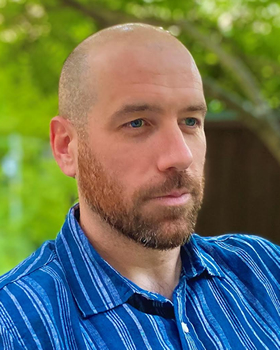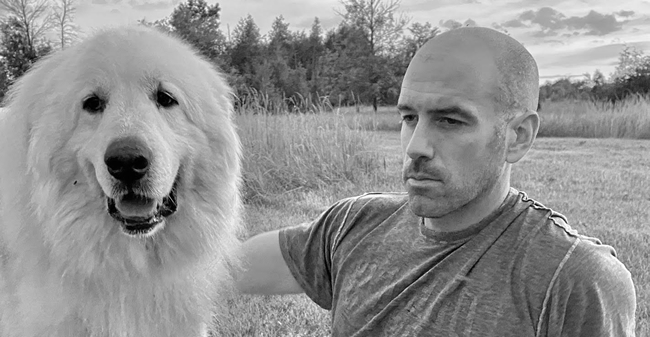

Up Close: Iain Reid
An Untraditional Kind of Care
Iain Reid—who you might know from his popular books I’m Thinking of Ending Things and Foe—has released another novel into our grabby hands.
In his latest work, WE SPREAD, Penny has been checked into Six Cedars Residence, an unusual and small home for elderly in need of care. She does not remember visiting this place before or her now-dead husband signing her up for care, but the Residence insists that all is in order, and she hesitantly (and with much confusion) agrees to move. After all, she’s been living alone (very alone) for some time, and she did have that nasty fall. She’s completely on her own. She could fall again, be marooned on the floor of her apartment, slowly starving to death…passed on before anyone thought to check.
Six Cedars is… untraditional. There are only three other residents, one caregiver, and the owner. It is isolated, far far away from the city. No one is allowed to leave the building. Penny hears noises at night. She loses track of time. Of memories. Of her own body.
But is her aging, exhausted brain at fault, or is there something sinister going on within the walls of Six Cedars?
In this exclusive interview with The Big Thrill, Reid talks with us about his writing process and hints at a potential adaptation to come.
In both I’m Thinking of Ending Things and Foe, the focus is built around a romantic relationship. In WE SPREAD, the novel begins after a relationship has ended, leaving someone who had a constant companion throughout her life adrift. Why the change? What did it allow you to do that you would have been otherwise unable to?
I don’t write using an outline. I usually just start with an idea or an image or a question or a character. In the case of WE SPREAD, I had the character of Penny in mind as I started writing. The more I wrote, the more I learned about her. I discovered that her relationship had a significant impact on her life, and so I wanted to explore that in the story in various ways.
You’ve now written three first-person novels, two from a woman’s perspective, one from a man’s. Was there a striking difference in tone or approach for you? Do you have a preference in writing one over the other?
I find each new project feels very distinct. I’m a slow writer, and it takes me a while to figure out the narrative style of each story, but eventually I do.
Penny is a painter—painting is her encouraged “keeping busy/producing” activity for Six Cedars. Why did you choose that for her? Was there any other occupation you had considered for her at first?
It was early on in the process that I uncovered Penny’s sincere interest in art and painting. Although her partner was a professional painter, it was never Penny’s occupation.
Speaking of “keeping busy/producing” at Six Cedars, the three other residents are also quite accomplished. Hilbert, the resident mathematician, has a clear role in helping explain the central premise to the readers, but Ruth, the linguist, and Pete, the violinist, do not. Why did you choose those two occupations? Was there purpose in those choices?
As I worked on the book, I experimented with various aspects of the story, like structure, but also details about each character. It’s not an efficient way to write, but I do enjoy it more when it’s not planned out. I feel like I make little (and big) discoveries about each character along the way.
There is not a clear ending or explanation to this novel—this is very much a Choose Your Own Explanation novel. While a book is no longer the author’s once it enters the reader’s hands, when writing it did you have a single, clear explanation in mind? Or did Penny’s journey take you by surprise just as it did the rest of us?
The story did surprise me as I worked on it. I’m always hoping to surprise myself. I have my own interpretation of what happens at the end of the book, but I wouldn’t say what that is because I think it’s better if readers can have their own interpretation after reading.
Out of all the fears that infest this novel—aging, physical infirmity, mental infirmity, your very existence being at the whims of others, and so on—which do you personally find the most frightening?
There are certain cultural expectations and norms explored in the novel, questions about conformity and productivity and aging, that I find quite scary.
Does it look like WE SPREAD will be adapted for the screen, as your previous two novels were? Whether or not it is, who, in your mind, would be the perfect Penny? Shelley?
I’m co-writing the WE SPREAD film adaptation with the filmmaker Minhal Baig. She’s brilliant, and I’m fortunate to be working with such a talented collaborator. Since we’re still discussing casting, I’d better not give anything away.
What do you have coming down the pipe next? Is there anything you would like to promote as we sign off this interview?
I’m looking forward to the film adaptation of Foe being released in 2023, and I’m excited for people to see it.
- LAST GIRL MISSING with K.L. Murphy - July 25, 2024
- CHILD OF DUST with Yigal Zur - July 25, 2024
- THE RAVENWOOD CONSPIRACY with Michael Siverling - July 19, 2024





